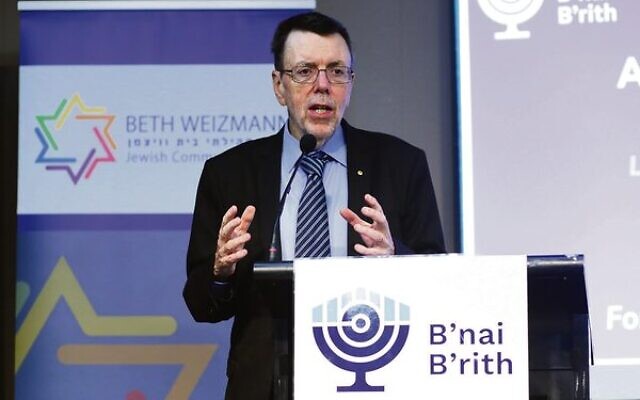Greg Sheridan says taking legal action was right
The prominent journalist says he is astonished at the facts revealed in the recent Brighton Secondary College court ruling.

One of Australia’s most prominent journalists says he is astonished at the facts revealed in the recent Brighton Secondary College court ruling, but insists Australia is not fundamentally a racist country.
Greg Sheridan, foreign editor of The Australian, spoke earlier this week at Melbourne’s Beth Weizmann as part of B’nai B’rith’s Armchair Society series of current affairs discussions, also sponsored by the Lamm Jewish Library of Australia.
His wide-ranging talk to a capacity crowd who turned out despite pouring rain was about threats to democracy, but questions about the recent Brighton ruling sparked a noticeably strong reaction from the audience.
Sheridan said before he saw the facts about the case brought by five former pupils at the school in the news, he wouldn’t have believed it.
“I don’t believe that I was ever at school with anyone who it would ever have crossed their minds to use a swastika as a symbol to represent their view of someone else. I just find it staggering,” he said.
Sheridan did not primarily blame the pupils involved, but focused his comments on the school’s leadership for not stepping in.
“I couldn’t believe that a teacher wouldn’t immediately jump on it, that the teacher’s supervisor wouldn’t immediately jump on a teacher who didn’t suppress it quickly, that a principal wouldn’t have taken action, that the education department supervising the principal wouldn’t have taken action,” he said.
“While normally people shouldn’t litigate schoolyard disputes, this case was so far beyond the parameters of anything that you could regard as normal, and the institutional failure at every level in the school was so egregious, that it was absolutely right to take legal action.”
Sheridan does not believe Australia generally is antisemitic.
“John Monash was a Jewish Australian of German background, and he led our troops in World War One. Isaac Isaacs was our first Australian-born governor-general and the controversy about him was not that he was Jewish, but that he was born in Australia,” Sheridan said.
He said his wife is from Malaysia of Indian background and their three sons are of Punjabi background and they haven’t felt any kind of racism routinely extended in Australia, although obviously it exists.
Part of his analysis of the persistence of antisemitism is that in the modern world, Western academia has come to regard the West itself as intrinsically evil, and Israel is seen as part of the West.
“And so Israel – having been demonised for 2000 years of antisemitism saying it’s alien to the West – is now demonised because it’s part of the West, and this seems to me completely crackers,” he said.
Sheridan thinks the Jewish scriptures, what the Christians call the Old Testament, ought to be routinely celebrated as part of mainstream culture, because Jewish tradition is part of the inheritance of humanity.
He said, “They are a series of works of Jewish genius and they’re the foundation of our civilisation.
“I’d encourage people to actually read the Jewish scriptures because they not only have tremendous richness, but great fun.”

comments